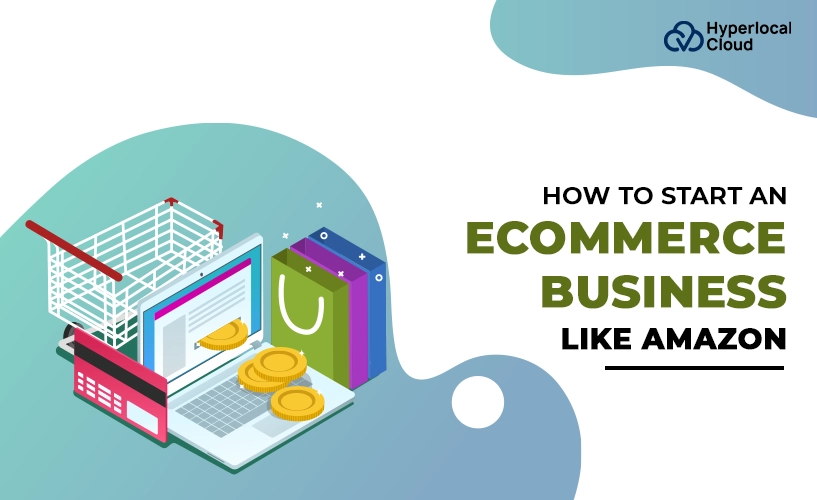How to Start an Ecommerce Business Like Amazon

Post digitalization people are accustomed to buying a wide range of products online on ecommerce marketplace. With the click of a button you can buy office coffee mugs, televisions, bed sheets, basically everything delivered right at your doorstep.
According to the internet, at least one new e-commerce site launches every day. The abundance of pre-made, powerful scripts available today makes launching an online clothing store or any other kind of online business easier. You can launch these web-based ventures with little to no background in IT.
Nowadays, creating an online retailer like Amazon is as easy as making an online purchase. Read on to learn the secrets to launching a successful Amazon clone.
eCommerce Websites Growing in Popularity
- It is estimated that 12 million – 24 million ecommerce sites are across the globe and new ecommerce businesses are being introduced every single day.
- Amazon’s ecommerce sales in the US was 44% of all US ecommerce sales in 2017.
- It is estimated that by 2040, 95% of all purchases will be through ecommerce.
Why Start an eCommerce App like Amazon?
The online market is experiencing a meteoric rise, so it is advantageous to start and set up an ecommerce store like Amazon.
1. An eCommerce website can help you reach customers anywhere in the world, any time.
2. You can offer customers the flexibility of accessing your online store 24*7, which they will appreciate.
3. eCommerce platforms can save a lot of money on overhead expenses like storefront rent, security systems, utilities, and employee benefits because they don’t have to maintain a physical location or employ a large staff, resulting in less expensive operating expenses than traditional storefronts.
4. People are beginning to appreciate the ease and comfort of shopping online. Earlier, people had to look for the products at physical stores despite heavy traffic and busy schedules. But now everyone involved finds life easier with online shopping. Stop lugging around heavy shopping carts or wasting time looking for specific items.
Planning To Build Ecommerce Business Like Amazon, Share Words With Us
How to Start an E-commerce Business Like Amazon
Value Proposition
If you want to create something like Amazon and make it successful, you must know what sets your site apart from the competition. Guerric de Ternay, the author of The Value Mix, helpfully defines a value proposition.
The value proposition is a customer’s perception of the benefits of purchasing, using, or consuming a specific product or service compared to available alternatives.
Amazon simplifies things by having two types of customers:
- Sellers
- Buyers
Buyers’ value proposition highlights the following advantages.
- Lower Costs
- A variety of products are available on the platform.
- Effortless Transactions
- Convenient worldwide delivery
- Buyers find it helpful to have the ability to shop in their native language, keep track of their packages, determine their import fees in advance, and access help at any time of day or night.
Statista lists several factors that Buyers consider before they purchase on an eCommerce platform like Amazon.
- Fast and free shipping – 80%
- A broad selection of goods – 69%
- Prime membership – 65%
- Best pricing – 50%
- Easy return process – 44%
Amazon’s marketplace can help sellers make more money than their online stores.
- A comfortable selling platform
- A place for them to advertise their services
- Access to the most extensive customer database
The ability to create an Amazon store from the brand’s shop to protect intellectual property and sell using Amazon’s order system.
Creating a Scalable Business Plan
To succeed, e-commerce store owners require a solid strategy. With a solid business plan, you can anticipate potential pitfalls, pinpoint existing issues, and establish firm targets for growth. The concrete business plan of your online store will determine if you are expanding or contracting. Retailers who carefully think out their E-Commerce strategy will succeed, while those who rush into things will fail.
Choose a Business Model
Amazon and other online marketplaces use a “hybrid business model” that combines multiple revenue streams to create more stable earnings.
The Amazon Marketplace generates revenue through commissions, flat fees, and membership fees.
Commissions: Online marketplaces have proven that this business model is the most successful. Depending on the category, Amazon’s commission rates range from 12% to 16%.
Flat rate: The marketplace charges a flat fee of $0.99 per transaction.
Subscription: Subscribers of Amazon Prime receive several benefits, including free two-day shipping, access to unlimited streaming of movies and music playlists, unlimited photo storage, and more through a paid membership service. This will cost them $119 yearly. Currently, paying customers exceed 100 million, and the number is steadily increasing.
Affiliate: The affiliate links displayed on their sites can earn affiliates a 1-10% commission on sales.
Start Your Online Ecommerce Business
There are two ways to start ecommerce business like Amazon.
1. Creating a platform/website or app from scratch
2. Choosing Readymade solution
Build Your Online Store From Scratch
Building your online store from scratch is a complex and time consuming. It takes several months to launch your online business as per the features needed for your store. There are many ecommerce platforms available on web which you can use to start your online business. As there are number of platforms available and offer different features, it can be challenging to select the one that effectively fulfill your needs and fits your budget.
For example, if you looking to sell various types of products, Shopify is the best option.
As per our experience, we recommend choosing a readymade solution for your ecommerce business.
Choose A Readymade Solution
With the help of readymade solution, you can set up your online shop in a few days. A reputable e-commerce development company like Hyperlocal Cloud can help you set up your ecommerce platform in a matter of days with an Amazon clone. Readymade solution offer advantages such as:
- These are affordable.
- The sellers can customize it with fewer modifications.
- It is pre-designed and does not require coding.
- Your online store can be launched immediately.
These scripts can help companies launch a similar platform to Amazon with little to no fuss. These mammoth platforms inspire these scripts by sharing their look, feel, interface, philosophy, and design. Acquire the script, set it up, tailor it to your E-Commerce requirements, populate it with product and services data, and launch.
Choosing The Tech Stack
The team must select the most appropriate technologies for implementing all the essential features. Typically, the technology stack selection is dictated by factors such as time, money, and complexity of features.
MVP Development
The architecture development phase includes developing back-end and front-end programming and designing and testing user interfaces and experience. After launch, we prefer maintaining the product to ensure everything runs smoothly.
Make Product Listing Pages
An online shop should always have a lot of product listings. After establishing your website, you should build your product catalog by creating detailed listings for each item. Categorize and organize your listings now to facilitate future site visitors’ management and discovery.
Prepare Accounting, Inventory, And Payment Methods
Once you load up your eCommerce site with products, you must attend to a few more important details, such as establishing a payment processor and incorporating inventory and tax tools. When choosing a payment gateway, consider the fees, security measures, and website compatibility.
Set up the inventory management software to monitor product availability and stock levels. Also, consider using tax tools to help you handle taxes for your web store.
Use these resources to determine the appropriate tax rate for yourself and your clientele. Ensure that they have a good understanding of the latest tax regulations.
Test And Launch
You can test and make the website public when you have met all the necessary conditions. To achieve successful testing, the user must ensure that each link and page functions properly and provides a satisfying experience.
Try to manage a shopping cart and make a purchase effectively. You can simulate a payment on most systems without actually using your card. Ensure the confirmation email is sent to the appropriate recipients after approving or declining a transaction.
Finally, ensure that your website’s mobile version displays and functions properly. Try using several different web browsers to assess the site’s functionality.
Implementing the Right Market Strategy
To model your eCommerce business like Amazon’s marketplace or follow its business model, you need to use an effective B2C or B2B marketing strategy. Your store can benefit from social media marketing, digital marketing, e-mail marketing, search engine optimization services, etc., to spread the word. Around the world, social media has an estimated participation of 3.196 billion people. Estimates indicate that the number increases by 13% annually.
Measuring the Significant Data
To evaluate success, you must access key performance indicators or KPIs. Examples include:
- Boosting sales.
- Increasing website traffic.
- Dealing with unsold inventory at the end of the month.
- Developing sales strategies.
Launch Your Million Dollar Ecommerce Business Like Amazon Solution In A Few Bucks
Key Takeaways To Start An Ecommerce Business Like Amazon
Build An Audience Base: To attract popular brands for collaboration and sales through your online shop, you must build a massive audience willing to purchase from you.
Create a Subscription Program: Creating a monthly subscription program enables you to manage sales and guarantee a consistent flow of revenue. The company could offer a recurring shipment of products, provide access to exclusive brands, or give a monthly discount.
Work with Quality Sellers & Products: When starting, you may be tempted to accept any product from any brand that comes your way. Resist the urge. Don’t! Draw in more established, high-quality brands by starting strong. Carrying more premium labels will help you attract more premium labels.
Make Customer Service Your Main Business: Prioritize your customers’ needs in everything you do, and you’ll succeed.
Core Features Of An Ecommerce Website Like Amazon
First, you must identify the most important aspects of a ecommerce website like Amazon before attempting to build it. We compiled a list of essential functions for both the vendor and buyer control panels.
Features For Admin
Master Dashboard: Master dashboard provides the admin the capability to have a bird’s-eye view when managing an e-commerce platform.
Product Management: The admin can manage all products in the store by adding, removing, and altering categories, as needed.
Stock Management: Admin can set minimum and maximum stock levels for inventory and receive alerts when inventory falls below those levels.
Vendor Management: The admin can easily manage vendor activities by controlling their selling privileges, setting their commission rates per sale, and monitoring real-time purchase visibility.
New Arrivals: The admin can label a section of the ecommerce platform as “New Arrivals” to show and sell your most recent products to your customers.
Sales: Keep track and analyze sales data on a daily, monthly, and annual basis easily with this sales feature.
Reports: Admin can peruse reports detailing product stock, price comparisons, and wish lists for more efficient management.
Features For Sellers
Login and Sign Up: Users should be able to sign up and login easily using their phone number, email address, or social media.
Listings: Sellers who sign up for a vendor account should be able to list their products. Vendors need to have complete control over their product pages.
Notifications: Customers can stay abreast of any account-related activity, including orders, listings, and offers, by using notifications.
Payment System: The payment system of the sellers must display information about every transaction, such as charges, credits, reviews, adjustments, past orders, and refunds.
Shipping Management: Amazon sellers can ship their packages themselves or use the Fulfillment by Amazon service.
Order Management: Retailers can better manage product orders with the Order Management function. This function lets the business print packing slips, assign product order IDs and view shipment details. Sellers can also use this page to contact buyers.
Ratings and Reviews: Ratings and reviews allows sellers to monitor their feedback, respond to questions, and see how they stack up against the competition.
Reports: The report function allows sellers to check customer reports, examine report specifics, and arrange reports by order date.
Features For Buyers
Login and Sign Up: Signing up as a buyer requires less hassle than signing up as a vendor. Buyers must provide their name, email address, and a strong password during registration.
Payment System: The payment system should simplify the payment process for customer purchases. PayPal, Braintree, Stripe, MANGOPAY, Adyen, and Dwolla provide buyers a secure and hassle-free shopping experience through their marketplace payment solutions.
Shipping Management: Buyers go to the ecommerce website “Your Orders” page to view tracking information and make adjustments to their shipping preferences. Buyers can follow orders in real-time, view delivery estimates, and learn all about their various shipping options and the precise location of their packages.
Buying Management: To purchase items from Amazon, click the “Buy Now” button for instant payment or add them to your virtual shopping cart.
Messaging: Vendors can answer buyers’ questions about a product or provide clarification using the messaging system.
Ratings and Reviews: Companies should enable buyers to provide feedback on the products they have bought to help other customers make informed decisions. The rating system boosts a company’s trustworthiness and the number of customers it attracts.
Notifications: Buyers can choose to receive service notifications. Ecommerce apps alerts its buyers about their orders, shipments, and payments.
Customer Support: Customer support helps buyers voice concerns, get answers to burning questions, and get in touch with the site’s administrators.
Wishlist: Users can add items they’d like to purchase later to a “wishlist” listing.
Disputes: Sellers can receive complaints about the quality of services clients provide using this feature. For instance, if the buyer does not receive the purchased items, they may dispute the transaction.
Build Tailor Made Ecommerce Business Like Amazon With Industry Experts And Proven Strategies
How Much Does It Cost to Build a Website Like Amazon?
Various features determine the price of creating an ecommerce app like Amazon, a multi-vendor online marketplace at its heart. Creating an Amazon clone could cost between $5,000 and $30,000. You can launch with a bare-bones product and then improve it later.
A custom eCommerce website with all the bells and whistles, like Amazon, could cost you between $73,200 and $105,000 in terms of pricing.
However, we suggest cutting down on expenses by using a white-label ecommerce solution. You can create a website with basic functionality similar to Amazon’s using standard eCommerce platform features for between $2,000 and $10,000.
Different factors may affect how much it costs to make a website like Amazon. However, we should consider the most crucial considerations as the complexity and number of features we implement.
- Access module
- E-commerce module
- Emails/SMS on orders
- Payments/Refunds via Stripe
- Vendor/Service provider module
- Management module
- Analytic module
- CMS module for Blog & Pages
- Performance & SEO
Build An Online ECommerce App Like Amazon With Us
You can expand your business by promoting a solid strategy and having a flexible, user-friendly app. Hyperlocal Cloud can help you set up an online store or e-commerce application to take your business to a wider audience.
We have extensive experience as a leading software development company. We set ourselves apart from the competition by dedicating ourselves to achieving the best possible outcomes for our customers. Our moral compass is founded on the achievements of our customers.
Our dedicated development team will design, build, and launch web and mobile applications that boost revenue and expand clientele. Don’t hesitate to contact our experts if you’re considering creating an eCommerce mobile app like Amazon to complement your business’s offerings.





